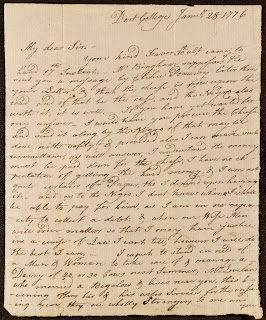
In January of 1776, in the midst of the Revolutionary War, Eleazar Wheelock, the founder and first president of Dartmouth College wrote to Captain Asa Foot regarding the purchase of a cheese and a Negro. Lest there be any doubt about Wheelock's intent, he states "as to the Negro, I don't know when I shall be able to pay for him…"
While it should come as no surprise that Dartmouth College was founded, in part, on the backs of slaves, it is not something that gets discussed on a regular basis. Nor is Dartmouth alone. Craig Wilder's new book
Ebony & Ivy: Race, Slavery, and the Troubled History of America's Universities brings out the role that American colleges and universities have played in aiding and abetting the institution of slavery. Wilder's research specifically mentions Dartmouth and it is important to note that Wheelock owned at least eight or nine slaves. When he came to Hanover to carve the College out of the wilderness, he brought some of these slaves with him and it seems likely that they performed much of the hard labor needed to clear the land and establish the College.

Dartmouth's complex relationship with slavery does not end with Wheelock. In the 1830s Dartmouth had both an Abolitionist Society and a Colonization Society, while at the same time sporting a pro-slavery president, Nathan Lord.
To learn more about Wheelock and the College's early relationship to slavery, come to Rauner and request any of the manuscripts listed below:
- 757157 Bill of sale, William Clark to Eleazar Wheelock; for "Ishmael, being a servant for life"
- 760276 Bill of sale, Peter Spenser to Eleazar Wheelock; for "Negro manservant named Brister"
- 761477 Bill of sale, Timothy Kimbal to Eleazar Wheelock; for "a certain Negro man named Sippy" [name mis-transcribed, but unclear]
- 762313 Bill of sale, Ann Morrison to Eleazar Wheelock; for "a Negro man named Exeter…a Negro woman named Chloe…and a Negro male child named Hercules.
- 765554.2 Occom to Wheelock; re: needs use of Negro and oxen
- 768675 Benjamin Bill to Exeter; re: complaint that Exeter abuses his wife
- 768675.1 Benjamin Bill to Wheelock; re: complaint against Exeter
- 769240.1 Theodora Phelps to Wheelock; re: lending one of his slaves
- 769365 Jacob Johnson to Wheelock; re: death of his Negro
- 769474.2 Eleazar Wheelock to John Wheelock; is going to Albany for his health and taking Brister along to wait on him
- 772167 Buckingham to Wheelock; re sale of slaves Nando and Hagar
- 773306 Wheelock to Captain Moses Little; will buy slave Ceasar for £20
- 775157 Wheelock to John Hubbard; agrees to pay Thomas Devine's debt and obtain release from imprisonment. Devine to be indentured to Wheelock. [likely white indentured servant, but not clear]
- 775673 Wheelock to Gideon Buckingham; Owes the one hundred pounds expected from the addressee and is in difficulty because he cannot pay the money. Offers to give Nando 20 acres of land and his freedom if heirs agree to send him and Hagar to writer who thinks God is displeased at the heirs for allowing Nando to treat his wife as he has.
- 776128 Eleazar Wheelock to Asa Foot; "procure the cheese and send it along with the Negro if that may be done with safety"…"and as to the Negro, I don’t know when I shall be able to pay for him"
- 779252.6 Wheelock will; which leaves all interest in his servants to his son John; to his servant boy Archilaus his freedom when he reaches the age of 25 years and if he is judged to be of good moral character, and also gives him 50 acres of land in Landaff or some other of his outland
- 786424 "Chloe, Negro of Hanover;" issues a complaint that Andrew Boynton has stolen a shirt off her fence
 Preparing for a class this week, we came across a tantalizing manuscript that we know little about: a Sufi devotional text created in the mid to late 18th century. It takes the same form as most Islamic manuscript prayer books of the time. It is in a wallet binding with the text framed in gold. Glossed instructions and comments radiate away from the text at angles defined by blind pressed grid lines. Decorative floral patterns luxuriously fill the empty spaces to create a surprising and satisfying page layout.
Preparing for a class this week, we came across a tantalizing manuscript that we know little about: a Sufi devotional text created in the mid to late 18th century. It takes the same form as most Islamic manuscript prayer books of the time. It is in a wallet binding with the text framed in gold. Glossed instructions and comments radiate away from the text at angles defined by blind pressed grid lines. Decorative floral patterns luxuriously fill the empty spaces to create a surprising and satisfying page layout.

